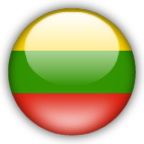|
- - -
Lithuania
BASIC INFORMATION ABOUT THE R&D STRUCTURE IN LITHUANIA
Commission on Science, Technology and Innovation Development
The Lithuanian R&D system consists of: 15 state universities; 17 state research institutes; 18 university research institutes; and 8 state research establishments. The system of state authorities, bodies and institutions involved in science & technology policy are:
The Ministry of Education and Science, in coordination with Science Council of Lithuania, sets priorities for research and technology development.
The Commission on Science, Technology and Innovation Development was established in March 2005 and is chaired by the Prime Minister. It is an advisory body to the Government. The Science Council of Lithuania and the Lithuanian Academy of Sciences serve as expert bodies, scientific advisers and consultants to the Parliament and Government on strategic issues of research and higher education. They analyze the situation in the research and higher education system of Lithuania and make proposals on drafting new legislation or amending the existing one to the Ministry of Education and Science.
The Lithuanian State Science and Studies Foundation implements state policy in the field of science and studies through the administration of monetary resources. The Foundation supports science by organizing competitions, through the public administration of state budget funds.
The Agency for International Science and Technology Development Programmes in
Lithuania established by Governmental Decree under the Ministry of Science and Education, is responsible for the administration and coordination of the EU Framework Programmes for Research & Technological Development, EURATOM, EUREKA, COST, and other programmes and activities in Lithuama related to international science, research and technology development. The Agency also participates in science, technology and innovation policy formulation, plays an active role in making
proposals to the Lithuanian legislative branch to facilitate and strengthen Lithuania's participation in international R&D programmes. The Agency works to ensure cooperation between academic and industrial communities by promoting participation in EU research and technology development projects as well as by promoting science and research activities to the public at large.
Higher Education Sector & Research Institutes
In Lithuania, one third of research and experimental development is carried out at universities, in order to ensure a high quality level of university studies. University research institutes carry out basic and applied research of high international quality. They provide the research basis for univer¬sity education and doctoral studies.
State research institutes established to carry out long-term high-level research are important for the Lithuanian economy, culture and international cooperation. The Ministry of Education and Science is the main authority responsible for research policy and coordinates research activities. State research establishments focus on carrying out applied research and experimental development activities which are necessary for the Lithuanian economy, culture and the development of i ndustry.
SUMMARY REVIEW OF R&D COOPERATION WITH BELARUS
The Agreement on Scientific&Technical Cooperation, concluded by Lithuania and Belarus in 2009, constitutes the legal basis for S&T cooperation between two countries.
In 2001 the Agreement on scientific cooperation between Lithuanian Academy of Sciences (LAS) and the National Academy of Sciences of Belarus (NASB) was concluded. As annex to the Agreement the Protocol on currency-free equivalent scientists exchange was signed, that provides mutual scientific visits realization on terms of financing stay expenses by hosting Academy (the annual exchange quota is 50 man-day for each Academy).
A number of Agreements and Protocols on cooperation is signed on the level of scientific institutes and universities of two countries.
Various legal frameworks for the collaboration between Lithuanian and Belarusian researchers have been used, such as 7FP, Baltic Sea Region INTERREG and others.
Since 2001 through the Calls of Belarusian Republican Fund on Fundamental Research (BRFFR) 15 Belarus-Lithuania research projects bilaterally financed have been and are being fulfilled.

© National Academy of Sciences of Belarus, 2011
|
|


